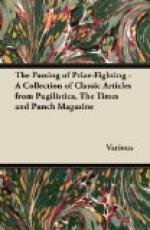* * * * *
“Two-seater Motor-car. 7-9 h.p., in perfect running order, Bosch magneto, Michelin tyres, spare wheel and accessories, Axminster and Brussels carpets, stair carpeting, lino., kitchen utensils, dinner service, copper chafing dish, pots, pans, lawn mower, deck chairs, &c., nearly new mangle, and numerous other effects.”—Local Paper.
Just the car for the White Knight when he takes to motoring.
* * * * *
[Illustration: Excited Officer (in demobilisation special). “I KNEW THE COUNTRY WAS GRATEFUL! LOOK AT THAT OLD CHAP WAVING HIS HOE AT US!”]
* * * * *
BABLINGO.
It has been suggested to me that the time has come for a comprehensive investigation of the interesting language known as Bablingo. Materials for this are ready for use in every home that still possesses a nursery with an inmate not more than two years of age. I must premise that it is the inmate’s mother and the inmate’s nurse, not the actual inmate, who use the language. Some day, no doubt, there will arise an investigator who will reduce to order and catalogue the inchoate efforts of an infant to make itself understood by talking. These efforts are doubtless of high interest to the etymologist, but the difficulties of the task are at present too great, and in any case I am not the man to undertake it.
I shall content myself for the moment with setting an examination paper in Bablingo for the purpose of testing knowledge. It will differ from most other examinations in having a further object—namely to supply instruction and information to the examiner. Later on it may be possible to construct a grammar, and to append to this a few easy exercises. It must be remembered, however, that there are great difficulties to be overcome in such a task. Every home, for instance, has its own rules for pronunciation. Of these I do not for my immediate purpose propose to take cognisance.
Here, then, is a short Bablingo examination paper for the use of mothers and nurses. I do not at present see my way to including fathers.
(1) On what principles is the language which you use in your nursery formed? Did you (a) acquire it, or (b) find yourself unconsciously in possession of it?
(2) Give a list of the characteristic features which distinguish Bablingo from the dialects employed by Prehistoric Man.
(3) What justification can you allege for the conversion of the words little thing into the words ickle sing? Are the spelling and pronunciation of these two words intended to be a concession to the feeble understanding of an infant?
(4) Wasums and didums, then? Was it a ickle birdie, then? Expand the above into a four-line verse with rhymes, and explain why the language as spoken and written is nearly always in the past tense, and rarely in the present or future.




